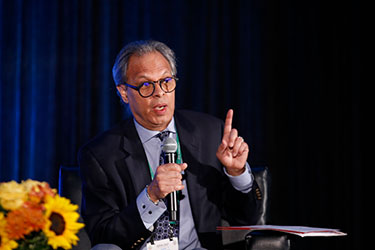Over 100 state and local laws have been passed this year in the U.S. that limit public health authority. And about 500 health officials have resigned during the pandemic due to harassment over COVID-19 safety measures.
A Monday session, “Public Health Under Threat: Legislative Limits to Public Health Authority,” took on both of these topics.
Though laws undermining public health are not new, the recent increase in legislation is unprecedented. Most of the new laws attack safety measures involving COVID-19. At least 32 states have enacted restrictions on health officials’ powers to: impose mask mandates and quarantines; close churches, schools and business; perform contact tracing; or invoke penalties for health restriction violations, according to a New York Times investigation published in October.
In Ohio, S.B. 22, a state bill that became law on June 23, empowers the state legislature to rescind any order or rule issued by the governor or the Ohio Department of Health involving the spread of a contagious or infectious disease.
“That means no more mask requirements and no isolation and quarantine,” said panelist Joe Mazzola, health commissioner of Franklin County Public Health in Columbus, Ohio. “It really does slow down our ability to respond to public health threats.”
Most of the laws were “spawned by politics and political posturing,” said panelist Donna Levin of the Network for Public Health Law.
Levin said there are ways to fight back, such as invoking constitutional law in some cases, and many of the new laws could potentially be struck down if challenged in court.
 The panelists, who included Eduardo Sanchez, chief medical officer for prevention at the American Heart Association, agreed that public health leaders need to improve their messaging.
The panelists, who included Eduardo Sanchez, chief medical officer for prevention at the American Heart Association, agreed that public health leaders need to improve their messaging.
County health commissioners have endured much of the pushback from the public. Mazzola said the hostility directed at him as an Ohio county health commissioner is sometimes hard to bear. When his email inbox and voicemail fill up with nasty comments, he reminds himself it’s not personal and that the anger will eventually pass.
Ohio has 113 local health departments, and as harassment of health workers has risen, there have been more conference calls among departments. The calls are a chance to check in and make sure everyone is doing all right.
“It starts with supporting one another,” Mazzola said.
Sanchez summed it up as “right message, right messenger and right access points.”
“Messenger matters and sometimes the (health) commissioner is not the best messenger,” said Sanchez, a former health commissioner of Texas. But “you can train for it, you can learn how to do it better.”
For more information, check out coverage from The Nation’s Health on efforts to limit public health authority.
Photo of Eduardo Sanchez by Jim Ezell/EZ Event Photography